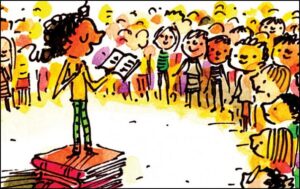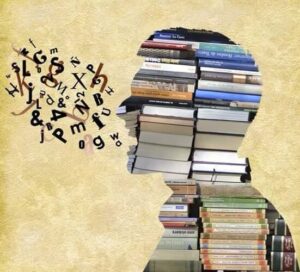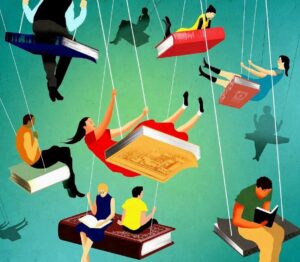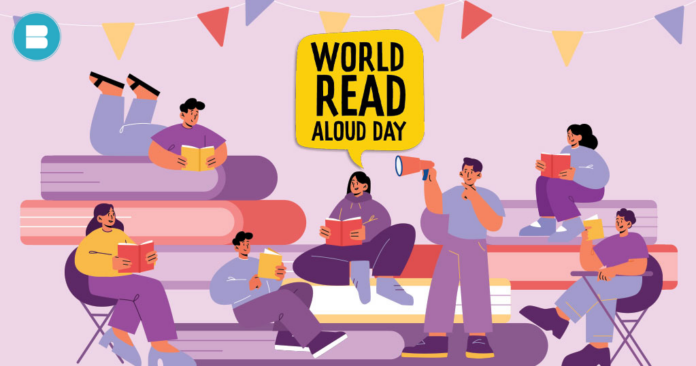By MUHAMMAD ABDULLAH HAROON
World Read Aloud Day, celebrated annually on the first Wednesday of February, is a significant event promoting reading aloud’s joy and importance. Acknowledgment of reading aloud as an action worthy of global celebration aims to highlight the power of words, and encourage literacy among people of all ages. Reading aloud fosters a love for literature and enhances comprehension, vocabulary, and critical thinking skills. It also serves as a reminder of how storytelling can connect individuals, enrich communities, and enhance educational experiences.
In recent years, artificial intelligence (AI) has emerged as a fascinating dynamic, influencing how literature is accessed, shared, and experienced. The development of AI-powered reading tools enhances reading experiences by offering real-time assistance, such as pronunciation guides, vocabulary explanations, and comprehension checks. Additionally, numerous applications using natural language processing allow users to read texts aloud and receive instant feedback on their pronunciation and fluency.

Virtual reading sessions powered by AI have allowed individuals from different parts of the globe to connect simultaneously. Readers now can share their experiences and perspectives in real time, fostering a sense of community despite geographical barriers. This global connectivity aligns with the ethos of World Read Aloud Day, which aims to unite people through the shared joy of reading. While some may question the authenticity and emotional depth of AI-created narratives, these stories can still serve as conversation starters and inspiration for readers. Incorporating AI-generated stories into World Read Aloud Day events were seen to spark discussions about the role of technology in storytelling and its implications for creativity and authorship.
However, countries like Pakistan seem to be present in dark shades in the vibrant global scene of education, reading, and shared experiences. Owing to challenges posed by socio-economic instability, the country has to grapple with a lack of access to quality education for its population. The country has one of the lowest literacy rates in South Asia, with estimates indicating that around 60% of the population can read and write (Pakistan Bureau of Statistics 2021). In rural areas, this figure drops even lower, exacerbating the challenges faced by children and communities in these regions.
In major cities, a number of activities are organized to promote read aloud activities. Schools invite local authors or poets to share their work, further enriching the experience and inspiring students. Celebrations of literary week by NGOs and literature festival by organisations like Academy of Letters host storytelling sessions and workshops, where community members gather to listen to readings and participate in discussions. This creates an inclusive environment that encourages individuals from various backgrounds to explore literature and share their thoughts.
Organizations that focus on children’s literacy, such as The Citizens Foundation and Indus Literacy Program, often leverage this day to highlight their efforts and the ongoing challenges in the education sector. They work towards creating more inclusive environments where every child has access to quality education and resources, acknowledging that reading is fundamental to personal and academic success. The aim of such events is to encourage not only parents but masses in general as well to participate in fostering a culture of reading, reinforce the importance of literacy, and demonstrate that reading is not just a skill but also a source of entertainment and bonding.
The government has undertaken a few public initiatives to promote digital access to reading. However, widespread internet accessibility remains a challenge, further straining an already fragile system burdened by socio-economic barriers, gender disparities, and limited resources.
Majority of Pakistani population either has no access to internet or its speed is so slow that it does not support sophisticated AI driven education tools and applications. This adds to further bleakness of education scenario in general and reading in particular Pakistan. Such a bleak scenario raises a crucial question: how can reading be celebrated among the common masses despite limited resources? Maximizing available potential is essential to fostering a love for literature, improving literacy, and contributing positively to social and economic development.
It has become a dire need of the hour to improve our connectivity through the internet. Special attention needs to be given to training teachers and educationists across the county so that not only do they be able to use AI applications for classroom teaching/ learning, and evaluation practices, but it must be extended to public libraries and community organisations.

Embracing initiatives like World Read Aloud Day can help the government contribute to cultivating resilience within the Pakistani community. It must be viewed as an initiative to promote critical thinking and analytical skills, both of which are essential for navigating an increasingly complex world. Activities like reading aloud would help students grow up into individuals who are not only more literate, but also have confidence in their abilities, are empowered to advocate for their rights and participate in civic life. Moreover, the celebration of reading aloud extends beyond literacy—it fosters social cohesion. In a multi-ethnic country like Pakistan, storytelling can serve as a bridge between diverse cultures and communities. Engaging in shared reading experiences allows individuals to connect across cultural divides, fostering understanding and empathy. This sense of community is essential for social stability, particularly in a country facing economic challenges and regional disparities.
Celebration of World Read Aloud Day is one way libraries can exercise their AI usage to manage their collections more efficiently, ensuring that popular and diverse books are readily available for community events. Additionally, AI can assist in efficient organisation of reading sessions, tracking of attendance, and analysing community participation trends over time. This data-driven approach can also be used to enable libraries to make informed decisions about programming, ensuring that future events resonate with the community’s interests and needs.
Another way to promote celebration of World Read Aloud Day in Pakistan is through an effective use of social media as a powerful tool. Platforms like Facebook, Twitter, and Instagram must be promoted as forums to share reading-related content, challenge followers to read aloud, and highlight the significance of literacy. Hashtags such as #WorldReadAloudDay and #ReadAloudPakistan can amplify these messages, encouraging a nationwide dialogue about the importance of reading. In a multi-ethnic country like Pakistan, storytelling can serve as a bridge between diverse cultures and communities. Engaging in shared reading experiences, be it through the virtual connectivity, allows individuals to connect across cultural divides, fostering understanding and empathy. This sense of community is essential for social stability, particularly in a country facing economic challenges and regional disparities.
However, the integration of AI in literacy and reading practices need a thorough analysis of critical considerations. Issues regarding privacy, content quality, and the potential replacement of human interaction in storytelling must be carefully navigated. While AI can enhance the reading experience, it is essential to remember the irreplaceable value of human connection—sharing stories in a personal, engaging manner fosters meaningful relationships among readers, educators, and communities.
Celebration of World Read Aloud Day by using social media and AI driven softwares and tools represent a convergence of traditional storytelling and modern technology. Together, they offer innovative ways to enhance literacy, promote educational equity, encourage reading, and connect individuals from varied backgrounds. By leveraging AI, we can enrich the reading experience, personalize learning, and engage communities worldwide. However, it remains crucial to balance the advantages of technology with the need for genuine human interaction and connection that lies at the heart of storytelling. As we navigate this dynamic relationship, we can look forward to a more inclusive and exciting future for reading and literacy globally. World Read Aloud day serves as a reminder of the need for continued advocacy for education and literacy programs in Pakistan. Incorporating these elements into reading sessions can make literature more relatable to young audiences.

Thus, World Read Aloud Day presents a unique opportunity for Pakistan to unite its citizens in recognizing and harnessing the transformative power of reading. As communities come together to share stories, they not only enhance individual learning but also contribute to a more informed, empathetic, and connected society.
World Read Aloud Day is not just an event; it is a movement toward a brighter, more literate future for all.
The writer can be contacted at jiyahar@gmail.com







